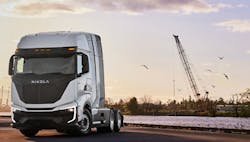Nikola gearing up for focus on Hydrogen in North American trucking market
A startup manufacturer of battery-electric and other zero-emission Class 8 trucks is reshifting to intensify its focus more on hydrogen-powered transport in the future.
Nikola Corp. announced this week it will reprioritize its future operations around hydrogen fuel cell-electric trucks, H2 refueling and autonomous technologies in North America. The revelation came during the company’s earnings call on Tuesday, in which it announced a net loss or 31 cents per share but reaffirmed its confidence technological achievement and growing sales.
Nikola, which already has survived slow, uneven growth and the federal conviction of its founder Trevor Milton on fraud charges last year, is gaining momentum with orders of 140 hydrogen fuel cell-electric trucks from 12 customers, according to the report..
“We have the right products at the right time, and as we move forward, we will be focusing on the North American market, hydrogen fuel cell trucks, the HYLA hydrogen refueling business, and autonomous technologies,” Nikola CEO Michael Lohscheller said in the earnings statement on the company’s website.
“We are on the right path with our re-energized management and commercial teams, improved sales strategy, new dealers, and energy partners,” Lohscheller continued.
Nikola has competed among a group of battery-electric truck manufacturers such as legacy firms such as Kenworth and Volvo as well as disrupters such as Tesla. The struggling firm has found some success with battery-electric models but sees its long-haul trucking future more in hydrogen fuel cells, which have longer range duration and shorter refueling times than battery-electrics.
Thus, the Phoenix-based startup is realigning its cost structure and moving capital investment toward H2 infrastructure and model production in North America. Earlier this month, Nikola executed a joint development agreement with Voltera to develop up to 50 of the HYLA-branded hydrogen refueling stations throughout North America over the next five years.
“Manufacturing and energy are capital-intensive businesses, and we need to remain focused where we have competitive and first-mover advantages,” the company’s earnings release reads. “
So, Nikola is making two big moves away from predominately battery-electric truck manufacturing and efforts outside of North America. One such break from the past is the decision to sell its stake in a European joint venture to Iveco Group for $35 million in cash and 20.6 million shares of Nikola common stock returned to the company, although Iveco will remain a supply partner.
Secondly, Nikola is pausing production of its Tre battery electric trucks at the manufacturing facility in Coolidge, Arizona. The company is not abandoning the Tre battery-electric truck, of which it produced 63 vehicles and delivered 31 to dealers, but decided on pausing to modify the assembly line in Coolidge to accommodate both hydrogen fuel cell and battery electric builds at the same time.
“After we resume production in Coolidge, the battery electric Tre will remain in our lineup as a build-to-order product,” the company’s earnings statement said.
Earlier this year, German logistics services and transport firm Richter announced partnerships with E.ON and Nikola to decarbonize its heavy-duty fleet. The letter of intent included a Richter commitment to order 20 Class-8 Tre hydrogen fuel cell-electric trucks and green hydrogen for fuel supply by 2024.
T&D World Live in Sacramento: Grid Transformation for an Electrified World
Hydrogen is an energy-dense, but light gas which does not contain carbon in its chain, so does not emit CO2 when combusted. Fuel cells employ an electrochemical process to convert fuel to electricity.
Hydrogen is not naturally mined or produced, but can be generated via carbon-intensive steam reforming of methane gas or by electrolyzers splitting the H2 from water. To be considered truly green hydrogen, the electrolyzers should be powered by zero-carbon or renewable energy resources such as wind, solar, hydro or nuclear.
Nikola Motors, like Tesla, was named in honor of the Serbian-American inventor and electrical engineer who helped understand and design the alternating current form of electricity delivery.
In 2020, a federal grand jury charged Nikola co-founder Trevor Milton for criminal securities fraud for lying about aspect of his business, but it did not indict the company itself. Those statements were seen as helping Nikola gain market capitalization above even Ford Motor Co.
In October 2022, Milton was found guilty in federal court of three counts.
About the Author
Rod Walton, EnergyTech Managing Editor
Managing Editor
For EnergyTech editorial inquiries, please contact Managing Editor Rod Walton at [email protected].
Rod Walton has spent 17 years covering the energy industry as a newspaper and trade journalist. He formerly was energy writer and business editor at the Tulsa World. Later, he spent six years covering the electricity power sector for Pennwell and Clarion Events. He joined Endeavor and EnergyTech in November 2021.
Walton earned his Bachelors degree in journalism from the University of Oklahoma. His career stops include the Moore American, Bartlesville Examiner-Enterprise, Wagoner Tribune and Tulsa World.
EnergyTech is focused on the mission critical and large-scale energy users and their sustainability and resiliency goals. These include the commercial and industrial sectors, as well as the military, universities, data centers and microgrids. The C&I sectors together account for close to 30 percent of greenhouse gas emissions in the U.S.
He was named Managing Editor for Microgrid Knowledge and EnergyTech starting July 1, 2023
Many large-scale energy users such as Fortune 500 companies, and mission-critical users such as military bases, universities, healthcare facilities, public safety and data centers, shifting their energy priorities to reach net-zero carbon goals within the coming decades. These include plans for renewable energy power purchase agreements, but also on-site resiliency projects such as microgrids, combined heat and power, rooftop solar, energy storage, digitalization and building efficiency upgrades.

